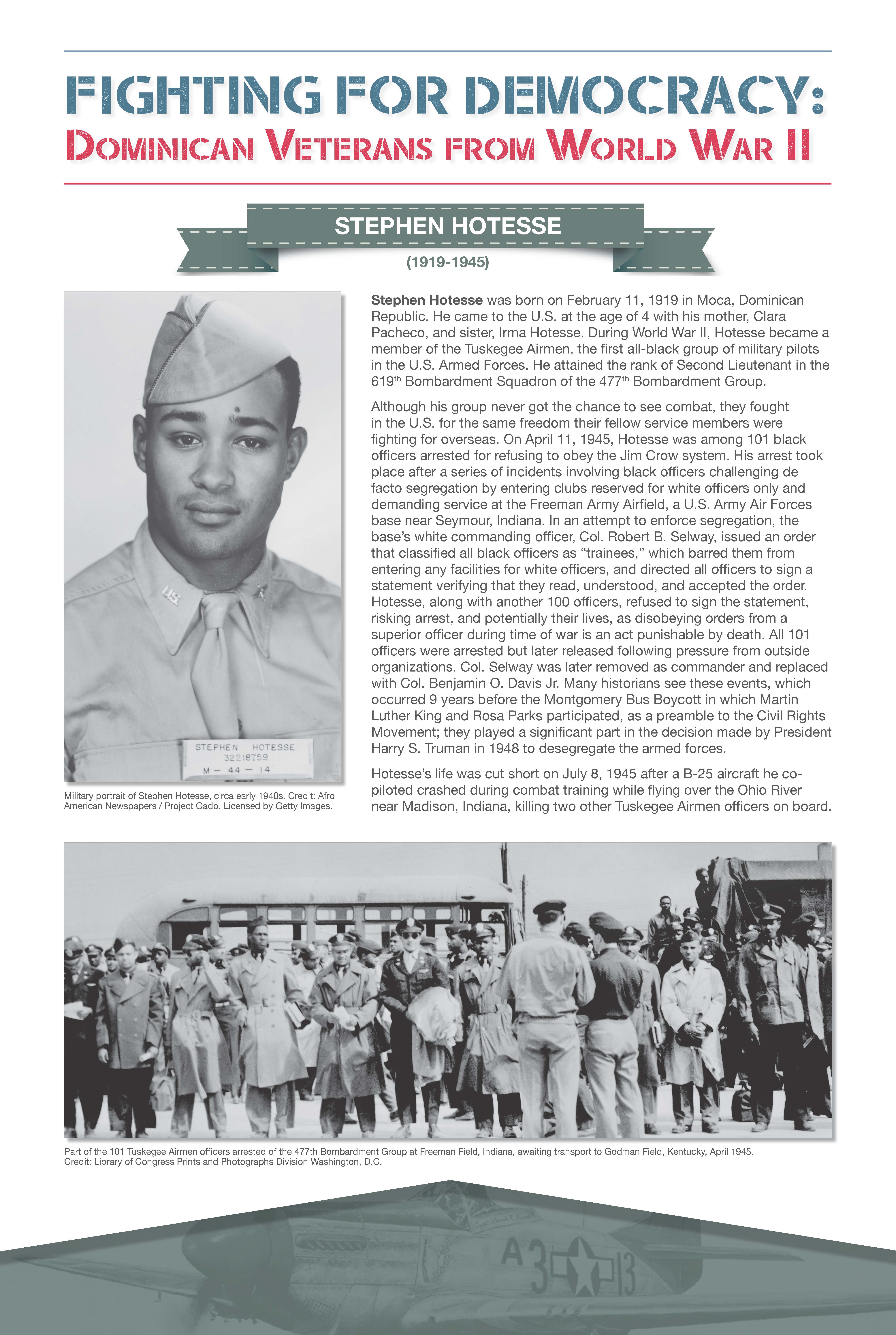Stephen Hotesse
Title
Stephen Hotesse
Subject
Dominican Immigrants|Dominican Veterans|Dominicans in Politics|Dominicans in the United States|Rafael Leónidas Trujillo|World War II
Creator
CUNY Dominican Studies Institute
Source
Afro American Newspapers / Project Gado, Getty Images, and the Library of Congress Prints and Photographs Division
Date
1919-1945
Contributor
Edward De Jesús, Principal Investigator / Curator
Ruth Lizardi, Coordinator / Assistant Curator
Dr. Ramona Hernández, Director, CUNY DSI & Professor of Sociology, The City College of New York
Anthony Stevens-Acevedo, Assistant Director
Idilio Gracia Peña, Chief Archivist
Sarah Aponte, Chief Librarian
Jessy J. Pérez, Archivist
Jhensen Ortiz, Assistant Librarian
Groana G. Meléndez, Photography Editor
Norma Guzmán and Donald Mounts, Researchers
Dr. Tim Williams, Senior Editor
Mariel Acosta, Katie Duarte, Shaday Fermín, and Anthony Stevens-Acevedo, Editors
John P. Bimbiras, Edward De Jesús, Jhensen Ortiz, Jessy J. Pérez, Sophia Monegro and Natalie A. Studt, Biography Text Writers
Isabelia Herrera, Grant Writer
Javier Pichardo, Graphic Artist
Sponsor: CUNY Dominican Studies Institute
Sponsor: Colin Powell School for Civic and Global Leadership at The City College of New York
Sponsor: Latino Americans: 500 Years - National Endowment for the Humanities
Sponsor: American Library Association
Sponsor: New York City Council
Sponsor: Smithsonian Latino Center
Sponsor: Center for Puerto Rican Studies (Centro)
Sponsor: The Documentary Forum - CCNY Center for Film, Journalism, and Interactive Media
Sponsor: Dominican Students Association
Format
24" x 36" panel
Language
English
Biographical Text
Stephen Hotesse was born on February 11, 1919 in Moca, Dominican Republic. He came to the U.S. at the age of 4 with his mother, Clara Pacheco, and sister, Irma Hotesse. During World War II, Hotesse became a member of the Tuskegee Airmen, the first all-black group of military pilots in the U.S. Armed Forces. He attained the rank of Second Lieutenant in the 619th Bombardment Squadron of the 477th Bombardment Group.
Although his group never got the chance to see combat, they fought in the U.S. for the same freedom their fellow service members were fighting for overseas. On April 11,1945, Hotsesse was among 101 black officers arrested for refusing to obey the Jim Crow system. His arrest took place after a series of incidents involving black officers challenging de facto segregeation by entering clubs reserved for white officers only and demanding service at the Freeman Army Airfield, a U.S. Army Air Forces base near Seymour, Indiana. In an attempt to enforce segregation, the base's white commanding officer, Col. Robert B. Selway, issued an order that classified all black officers as "trainees," which barred them from entering any facilities for white officers, and directed all officers to sign a statement verifying that they read, understood, and accepted the order. Hotsesse , along with another 100 officers, refused to sign the statement, risking arrest, and potentially their lives, as disobeying orders from a superior officer during time of war is an act punishable by death. All 101 officers were arrested but later released following pressure from outside organizations. Col. Selway was later removed as commander and replaced with Col. Benjamin O. Davis Jr. Many historians see these events, which occurred 9 years before the Montgomery bus Boycott in which Martin Luther King and Rosa Parks participated, as a preamble to the Civil Rights Movement; they played a significant part in the decision made by President harry S. Truman in 1948 to desegregate the armed forces.
Hotsesse 's life was cut short on July 8, 1945 after a B-25 aircraft he copiloted crashed during combat training while flying over the Ohio River near Madison, Indiana, killing two other Tuskegee Airmen officers on board.
Although his group never got the chance to see combat, they fought in the U.S. for the same freedom their fellow service members were fighting for overseas. On April 11,1945, Hotsesse was among 101 black officers arrested for refusing to obey the Jim Crow system. His arrest took place after a series of incidents involving black officers challenging de facto segregeation by entering clubs reserved for white officers only and demanding service at the Freeman Army Airfield, a U.S. Army Air Forces base near Seymour, Indiana. In an attempt to enforce segregation, the base's white commanding officer, Col. Robert B. Selway, issued an order that classified all black officers as "trainees," which barred them from entering any facilities for white officers, and directed all officers to sign a statement verifying that they read, understood, and accepted the order. Hotsesse , along with another 100 officers, refused to sign the statement, risking arrest, and potentially their lives, as disobeying orders from a superior officer during time of war is an act punishable by death. All 101 officers were arrested but later released following pressure from outside organizations. Col. Selway was later removed as commander and replaced with Col. Benjamin O. Davis Jr. Many historians see these events, which occurred 9 years before the Montgomery bus Boycott in which Martin Luther King and Rosa Parks participated, as a preamble to the Civil Rights Movement; they played a significant part in the decision made by President harry S. Truman in 1948 to desegregate the armed forces.
Hotsesse 's life was cut short on July 8, 1945 after a B-25 aircraft he copiloted crashed during combat training while flying over the Ohio River near Madison, Indiana, killing two other Tuskegee Airmen officers on board.
Citation
CUNY Dominican Studies Institute, “Stephen Hotesse,” Fighting for Democracy: Dominican Veterans from World War II, accessed November 21, 2024, https://dsi.ccnydigitalscholarship.org/dominican-veterans-wwii/items/show/45.

